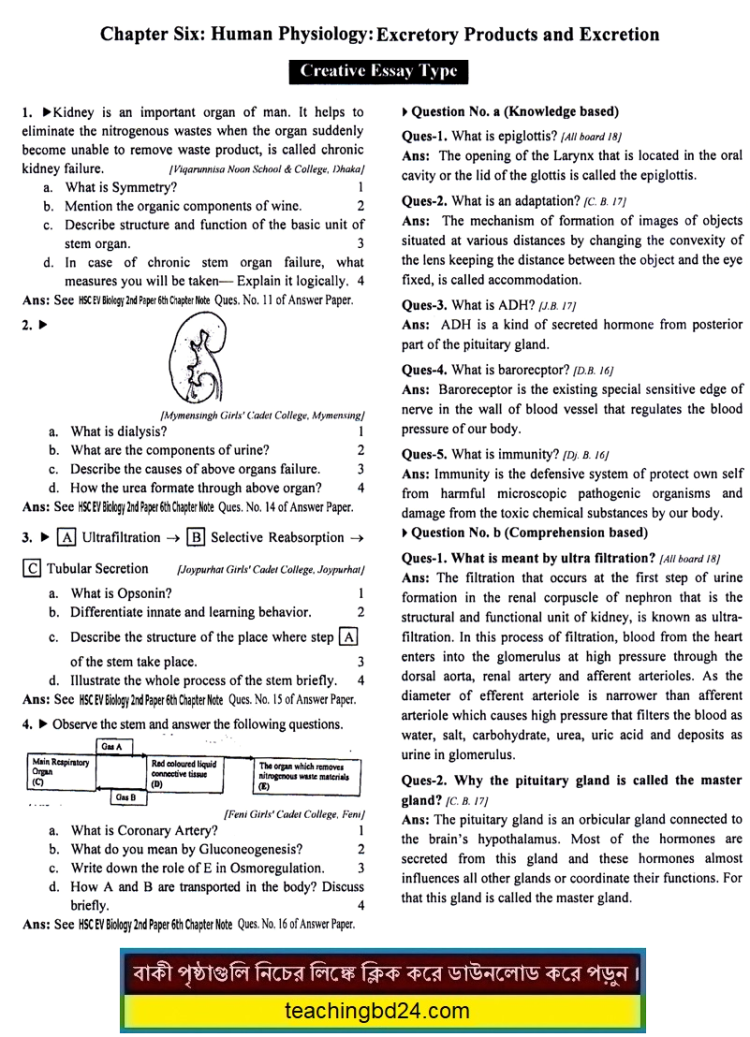EV HSC Biology II 6th Chapter MCQ Question Answer. Human Excretory Products and Excretion. The removal of metabolic waste products from the body of an organism is known as excretion. The major excretory products are carbon dioxide, excess water, and nitrogenous compounds like ammonia, urea, uric acid, etc. Carbon dioxide and water are produced in the process of tissue respiration. Kidneys are the main organ of the human excretory system.
The kidneys are paired organs in each individual. They are the primary excretory organ in humans and are located one on each side of the spine at the level of the liver. They are divided into three regions- the renal cortex which is the outer layer, the renal medulla which is the inner layer and the renal pelvis which is responsible for carrying the urine from the kidney to the ureter. The functional unit of a kidney is called the nephron. Every organism depends on a series of basic processes to live a normal life. These processes include the respiratory system, the circulatory system, the excretory system and more.
Excretion is an important part of an organism’s body. Different organisms follow different methods and modes of excretion. Let us know more about human excretion. Due to cellular respiration, a lot of gases and other waste products are produced inside an organism’s body. They must be removed properly and periodically. Without their removal, they can prove harmful to the human body as they can be toxic to the body.
EV HSC Biology II 6th Chapter MCQ Question Answer. Human Excretory Products and Excretion

EV HSC Biology 2nd Paper MCQ Question With Answer

Biology is the natural science that studies life and living organisms, including their physical structure, chemical processes, molecular interactions, physiological mechanisms, development, and evolution. Botany, also called plant science(s), plant biology or phytology, is the science of plant life and a branch of biology.
The fields within biology are further divided based on the scale at which organisms are studied and the methods used to study them: biochemistry examines the fundamental chemistry of life; molecular biology studies the complex interactions of systems of biological molecules; cellular biology examines the basic building block of all life, the cell; physiology examines the physical and chemical functions of the tissues and organ systems of an organism, and ecology examines how various organisms interrelate.
A botanist, plant scientist or phytologist is a scientist who specializes in this field. Zoology is the scientific study of animals. This discipline can include animal anatomy, physiology, biochemistry, genetics, evolution, ecology, behavior, and conservation.
The proper function of human bodies is dependent on smaller structures, or organs, such as the heart or lungs. The tiny cells that make up these organs actually contain within them smaller structures called organelles. These organelles help the cells to perform their jobs. In cancer, changes to these organelles can cause the individual cells and ultimately the entire organism to have serious problems. To get a better understanding of how cells work, we will now spend some time examining some of these subcellular structures.
The organelles that we will discuss are involved in the information flow within cells and in energy production. In addition, we will look at a structure that gives cells their shape and allows them to reproduce themselves. All of the organelles and processes to be discussed have direct relevance to cancer because these are the cellular structures/activities that become disturbed in the disease.
The image below shows two living mouse cells. The mitochondria are colored red and the nuclei (with brightly stained chromosomes) are colored blue. The green colored region near the nuclei of the cells represents the Golgi apparatus, an organelle involved in the processing and packaging of molecules within the cell.
teachingbd24.com is such a website where you will get all kinds of necessary information regarding educational notes, suggestions and question patterns of schools, colleges, and madrasas. Particularly, you will get here special notes of physics that will be immensely useful to both students and teachers. The builder of the website is Mr. Md. Shah Jamal who has been serving for 32 years as an Assistant Professor of Physics at BAF Shaheen College Dhaka. He expects that this website will meet up all the needs of Bengali version learners /students. He has requested concerned students and teachers to spread this website home and abroad.
EV HSC Biology 2nd Paper MCQ Suggestion Question Answer
Discover more from Teaching BD
Subscribe to get the latest posts sent to your email.

